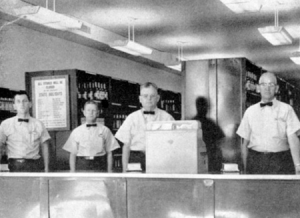Here’s a place to visit that you can’t visit anymore, and thank goodness for it. But there is some kind of nostalgia involved anyway.
In many US states and Canadian provinces, sales of alcoholic beverages are restricted to the government. That’s all right because these stores are indistinguishable from the private wine and liquor stores in other states. You walk down aisles with shelves stocked with wines, locally made and from around the world. Just because it’s an SAQ store (Société des Alcools du Québec) or one run by the Pennsylvania Liquor Control Board makes no difference. Do you really care if the profits go to the government instead of a private owner?
But it wasn’t always this. Just because Prohibition ended in the United States in 1933 and in 1920 in Canada (a wartime provision) didn’t mean that drinking alcoholic beverages was universally accepted. In fact, in many places it was considered to be a sin. Therefore, various jurisdictions reached the rather contradictory conclusion that if the state or province was opposed to sin it should nonetheless profit from the sinners. But they needed to be well aware that they were sinning. Hence, the state stores were born.
Photo courtesy of virginiaplaces.org
There were no aisles to wander. There were no gaily decorated bottles to see. There was no one to ask for a recommendation of what to serve with dinner that night. What there was was a counter, some civil servants and racks of bottles behind the counter, “unauthorized entry prohibited”. There was a price list of the products for sale in a plastic folder on the counter and you asked one of the civil servants to get you a bottle of whatever you intended to buy. These individuals were there to serve you, but it definitely wasn’t service with a smile.
It became a rite of passage for a teenage boy to enter a state store with a driver’s license clenched in his fist and ask for…what? Something. Anything. Just to prove that he could do it. Drinking from that bottle was almost an afterthought and it was surely not going to be a fine wine from the vineyards of Bordeaux (he probably couldn’t pronounce it, much less spell it). More likely he said, in a tremulous voice, “I’ll have a bottle of Gallo Hearty Burgundy, please”. Thus were the wages of sin paid.
Note that we refer to teenage boys. Legally speaking, girls were allowed but that just wasn’t done in those times. In fact, it was a brave grown woman who entered a state store. Moms looked askance if Dads even took their little children into a state store with them. Lucie’s Dad took her and she still remembers her Mom’s comments when they got home.
The whole point was that you were supposed to feel guilty. Guilt was the cement that bound the drinker with society, and it was guilt that washed the sin away from the state or provincial coffers. The underlying schizophrenia of such a system had to become unsupportable over time. Eventually, the governments came to realize that they could make more money from sin if they made it seem attractive rather than reprehensible. And so the stores became as they were and still are in their less restrictive neighboring states.
For those of us who enjoy tasting and drinking wine responsibly, it is hard to think back on these benighted times. But it’s good to do so from time to time, if only to put our pleasant avocation in context of our times…and those gone by.
